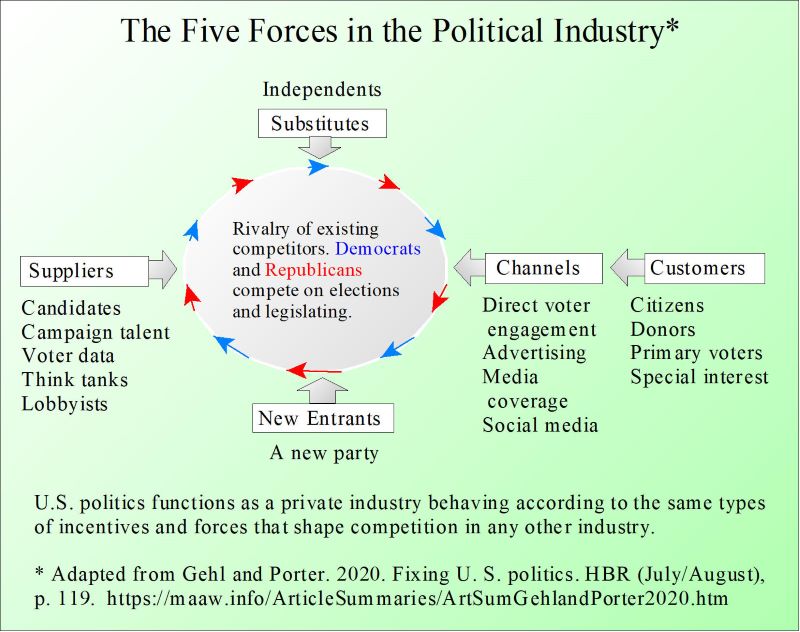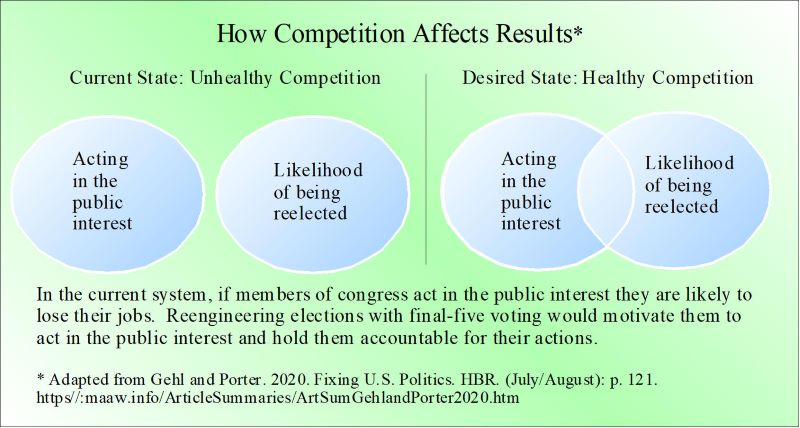
Summary by James R. Martin, Ph.D., CMA
Professor Emeritus, University of South Florida
Political Issues Main Page |
Economics Related Main Page
The U.S. political system has failed, but it is not broken. In fact it is designed by and for the benefit of the entrenched duopoly of the political system (Democrats and Republicans) to produce partisanship and gridlock. Our political system is not a public system based on high principles and impartial structures and practices derived from the constitution. It is instead a political industrial complex that behaves according to the same kinds of incentives that shape competition in any industry. Unhealthy competition and barriers to entry perpetuate our dysfunctional political duopoly, and business firms pursuing their own self interest have exacerbated the problem. The system will not correct itself to produce healthy competition. What is needed is a redesign of the system that includes strategic changes to the rules of elections and legislative processes that will create healthy competition and accountability. The business community also needs to change its engagement model to promote structural change in the system that will benefit both business and society.
Unhealthy Competition
There are five forces that shape competition in any industry:
1. The nature and intensity of rivalry,
2. the power of buyers,
3. the power of suppliers,
4. the threat of entrants, and
5. the pressure from substitutes that compete in new ways.
Competition in our political system takes place at two levels: to win elections, and to pass (or block) legislation. Democrats and Republicans divide up the voters according to ideological and partisan interests, and reinforce the division by demonizing the other side rather than working together to deliver practical solutions. The voters have limited influence because substitutes (independents) and new entrants (a new party) are blocked by barriers to entry including party primaries, plurality voting, a partisan-controlled legislative process, and various fundraising rules. Gehl and Porter refer to these barriers as elections and legislative machinery.
Elections Machinery
For more than 80 percent of U.S. House seats, the party primary is the only election that matters because a Democratic nearly always wins in Blue districts, and a Republican nearly always wins in Red districts. As a result, when considering a bill, a member of congress is mainly concerned with whether he or she will win the next party primary. This makes it impossible for members of congress to come together to solve challenging problems.
Plurality voting prevents new competitors from entering because the winner is the person that gets the most votes, not necessarily a majority. Plurality voting creates a spoiler effect where a candidate with little chance of winning pulls votes away from a similar, but more popular candidate. This causes additional competition to be viewed as problematic and creates a serious flaw in our political system.
Legislation Machinery
Our political parties have created rules that prioritize the interest of the political-industrial complex. For example, party leaders control committee chairs and membership. The House speaker controls the legislative agenda and can block a vote on almost any bill. These and other rules in the Senate typically produce gridlock and inaction, and little correlation between a member of congress getting reelected and their actions oriented towards the public interest.

The Role of Business
Corporations participate in the political process by lobbying, hiring former government officials, encouraging their employees to vote for certain issues and candidates, and spending aimed at influencing elections. These actions focus mainly on influencing economic policies, regulations, and regulatory enforcement that benefit particular technologies, industries, or companies, but do not advance the public interest. Instead they help enable unhealthy political competition that undermines the business environment in the long run. For example, Congress has done little to restore America's obsolete and inefficient infrastructure, or to develop a coherent immigration policy. However, the business community is in a position to serve as a powerful force for meaningful change in the elections and legislative machinery, and its own role in the political system.
The Political Innovation Imperative
Many political reforms have been proposed (e.g., term limits and limiting the money in politics), but effective systemic changes in the political system need to address the root causes of the dysfunction and gridlock, be achievable within years, not decades, and motivate political actors to produce results that benefit the public interest. Reengineering the elections and legislative machinery provides the most powerful and achievable alternative.
Elections Machinery Innovation
Gehl and Porter propose an approach they refer to as final-five voting that would replace the closed party primaries with open nonpartisan primaries. The top five finishers would advance to the general election. Plurality voting would be replaced with ranked-choice voting in the general election. All candidates from any party would appear on the same ballot. With ranked-choice, a candidate must receive majority support to win an election. If a candidate receives more than 50 percent of first-place votes, the election is over. If no candidate receives a majority, the candidate in last place is eliminated, and that candidate's votes are transferred to his or her voters' second choice. This process continues until a candidate receives more than 50 percent of the first-place votes.
The final-five voter model (top-five primaries and ranked-choice voting) would eliminate the spoiler effect described above. It introduces healthy competition into the elections process and changes the incentives of those in office. These changes could be achieved through state legislation, or ballot initiatives. The authors call it free-market politics.

Legislative Machinery Innovation
Gehl and Porter propose an approach they refer to as zero-based rule making. The idea is to remove the rules in the House and Senate designed to serve partisan power purposes, and the customs that create separate podiums, cloakrooms, dining rooms, and seating that separates members of Congress by party. Instead, a new rule book is needed that encourages members of Congress to work together to solve problems to benefit the public interest.
Rewriting the Business Playbook
Many companies have integrated social needs and challenges into their core strategy to create shared value. For example, there have been many initiatives to reduce greenhouse gases, improve employee health benefits, and improve training and career development for low income workers. But more must be done to address the failure of our democracy to solve our most important economic and social challenges. New voluntary standards are needed for corporate engagement with politics and government. For example, corporations should spend less on lobbying and elections, actively support reforms that reduce partisanship, align election and campaign finance rules with democratic principles, and do more to improve the overall business environment and initiatives to advance the public interest.
There is no greater threat to American economic competitiveness than our passive acceptance of a failed political system. Business leaders and American citizens must work together to fix this problem and save our democracy.
___________________________________
* This article is based on the 2020 book by Gehl and Porter. The Politics Industry: How Political Innovation Can Break Partisan Gridlock and Save Our Democracy. Harvard Business Review Press. Book review: Beginning America Over Again with a New Electoral System
Note: In 2019 a ranked choice voting system was approved for New York City's primaries and special elections. Voters rank up to five candidates on their ballot in computerized rounds with the person in last place being eliminated after each round. The ballots cast for that person are redistributed to the remaining candidates based on the voter rankings. This process continues until there are two candidates left and the one with the most votes wins. Atlanta Journal-Constitution (June, 23, 2021): A4.
Related summaries:
Busco, C., G. Fiori, M. L. Frigo and A. Riccaboni. 2017. Sustainable development goals: Integrating sustainability initiatives with long-term value creation. Strategic Finance (September): 28-37. (Summary).
Martin, J. R. Not dated. ASCE report cards for America's infrastructure. Management And Accounting Web. ASCE Infrastructure
Porter, M. E. 1980. Competitive Strategy: Techniques for Analyzing Industries and Competitors. The Free Press. (Summary).
Porter, M. E. and M. R. Kramer. 2011. Creating shared value: How to reinvent capitalism and unleash a wave of innovation and growth. Harvard Business Review (January/February): 62-77. (Summary).